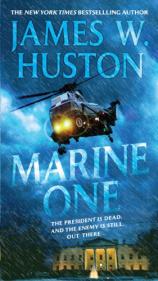Marine One
Review
Marine One
Let me start off by saying that MARINE ONE by James W. Huston is
not a military or espionage thriller. It’s not even a
particularly violent book, though it certainly has its moments.
Rather, it’s a courtroom thriller. But even if you’re
one who is not much for lawyers, let alone courtrooms, this novel
will have you reading on the edge of your chair, and maybe
beyond.
The basic plot of MARINE ONE is fairly simple. It’s a dark
and stormy night (no, Huston does not phrase it like that, but I
couldn’t resist) when the President of the United States
suddenly leaves the White House by helicopter for Camp David, for
reasons unknown to almost everyone, including his wife. Marine One
crashes, killing the President as well as a number of Secret
Service agents and the pilot, a Marine who made no secret of the
fact that he was not a fan of the President.
As might be expected in such a situation, the immediate focus is
not so much on what happened as it is on who might be blamed. The
scapegoat is WorldCopter, a French corporation whose American
subsidiary was awarded the contract to build the helicopter on what
some uncharitably describe as too fast a track. When WorldCopter
becomes the target of a criminal investigation and then a
potentially disastrous wrongful death suit, its insurer retains
Mike Nolan, a well-respected defense attorney who is uniquely
qualified to represent WorldCopter, given that he is a helicopter
pilot in the Marine reserves.
However, it seems that Nolan may be outclassed on this case. He
is up against a Plaintiff’s attorney who may well be the most
feared litigator in America, and the government’s own
investigation appears to be headed inexorably toward the conclusion
that negligence in the construction of the helicopter caused the
crash. Nolan, for his part, is being warned off the case by persons
unknown, while his own client seems to be losing faith in him.
Nolan, however, cannot shake the feeling that the key to the entire
incident lies with the President’s mysterious late night trip
to Camp David. Why was he in such a hurry that he disregarded the
advice of the Secret Service to travel through the rainstorm by
automobile rather than helicopter? Who was he seeing? And what was
the purpose of the meeting?
It seems that no one wants to answer his questions, and what few
answers he obtains on his own appear to lead to the conclusion that
Nolan’s client is guilty. But another tragedy, one that is
smaller but no less important to Nolan, inadvertently supplies his
with one of the most important keys to the case. As MARINE ONE
comes to a frantic conclusion, it seems that Nolan may be too late
to prevent a miscarriage of justice, one that may have worldwide
repercussions.
Huston, as he has demonstrated in his previous books, is always
interesting, often as much for how he does what he does as for what
he does. Here, he ratchets up the tension page by page, until it is
almost impossible to read it fast enough. Nolan is a
seat-of-his-pants litigator, a quality that contributes to the
suspense as well, given that he himself does not know precisely
where his case is taking him until almost the very end. And the
ending? You’ll be thinking about it for some time after you
finish MARINE ONE.
Reviewed by Joe Hartlaub on January 6, 2011




